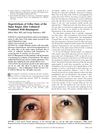 15 citations,
March 2004 in “American Journal of Ophthalmology”
15 citations,
March 2004 in “American Journal of Ophthalmology” Using bimatoprost on one side of the face caused increased cheek hair growth in a patient.
 11 citations,
July 2017 in “Expert Opinion on Investigational Drugs”
11 citations,
July 2017 in “Expert Opinion on Investigational Drugs” New hair loss treatments may include topical medications, injections, and improved transplant methods.
 10 citations,
September 2020 in “Journal of Cosmetic Dermatology”
10 citations,
September 2020 in “Journal of Cosmetic Dermatology” Deeper microneedling boosts hair growth, with 0.6mm needles and minoxidil being most effective.
 8 citations,
January 2003 in “Pharmacotherapy: The Journal of Human Pharmacology and Drug Therapy”
8 citations,
January 2003 in “Pharmacotherapy: The Journal of Human Pharmacology and Drug Therapy” Chemotherapy may cause recurring hair loss due to an autoimmune response.
 5 citations,
June 2015 in “Journal of dermatology”
5 citations,
June 2015 in “Journal of dermatology” A woman and her daughter had thallium poisoning from a herbal drink and rodenticide, causing hair loss and other symptoms.
 5 citations,
October 2013 in “Veterinary Clinics of North America: Equine Practice”
5 citations,
October 2013 in “Veterinary Clinics of North America: Equine Practice” Some horses lose hair without inflammation or itching due to various conditions, and while mainly a cosmetic issue, diagnosis requires examination and biopsies, and breeding is not advised if it's hereditary.
 3 citations,
July 2013 in “Journal of Cutaneous Pathology”
3 citations,
July 2013 in “Journal of Cutaneous Pathology” A woman's hair loss, resembling an autoimmune condition, improved after treatment, but requires ongoing checks due to potential serious associations.
 3 citations,
March 2008 in “Medical laser application”
3 citations,
March 2008 in “Medical laser application” Lasers have become safer and more effective for treating skin problems and hair removal.
 2 citations,
September 2019 in “South Asian research journal of pharmaceutical sciences”
2 citations,
September 2019 in “South Asian research journal of pharmaceutical sciences” Heavy metals in personal care products can cause serious health issues like cancer and hair loss.
 2 citations,
January 2019 in “Elsevier eBooks”
2 citations,
January 2019 in “Elsevier eBooks” Biotin supplements are unnecessary for most people but may help with certain conditions like biotin deficiency, brittle nails, and some hair loss.
 2 citations,
October 2016
2 citations,
October 2016 Chemotherapy and radiotherapy can cause skin side effects like rashes, hair loss, and nail changes, which are usually managed with conservative treatments.
 2 citations,
September 2004 in “Fertility and sterility”
2 citations,
September 2004 in “Fertility and sterility” High androgen levels can cause excessive hair growth and may indicate serious health issues, including heart disease and fertility problems.
 1 citations,
February 2022 in “Case reports in endocrinology”
1 citations,
February 2022 in “Case reports in endocrinology” An unusual growth of Leydig cells in a woman's ovaries caused her excessive hair growth, which was treated successfully with surgery.
 1 citations,
January 2020 in “Research Square (Research Square)”
1 citations,
January 2020 in “Research Square (Research Square)” Inherited color dilution in Rex rabbits is linked to DNA methylation changes in hair follicles.
 1 citations,
March 2014 in “Turkderm”
1 citations,
March 2014 in “Turkderm” Trichoscopy helps tell different hair loss types apart using specific scalp and hair patterns.
 1 citations,
April 2010 in “Expert Review of Dermatology”
1 citations,
April 2010 in “Expert Review of Dermatology” The document concludes that early diagnosis and treatment are crucial for managing rare hair loss disorders and that more research is needed to improve treatment strategies.
 1 citations,
June 1938 in “New England journal of medicine/The New England journal of medicine”
1 citations,
June 1938 in “New England journal of medicine/The New England journal of medicine” Hair analysis can offer clues about a person, but individual differences limit making precise identifications.
 January 2024 in “Frontiers for young minds”
January 2024 in “Frontiers for young minds” Alopecia is a condition causing hair loss that can impact looks and mental health.
 April 2019 in “Dermatology reports”
April 2019 in “Dermatology reports” A 12-year-old boy's hair fully regrew after 8 weeks of treatment for tinea capitis, and dermoscopy was useful for diagnosis and monitoring.
 August 2018 in “Journal of the American Academy of Dermatology”
August 2018 in “Journal of the American Academy of Dermatology” Calcipotriol may effectively treat hair loss in alopecia areata, working better in children than adults.
 May 2017 in “InTech eBooks”
May 2017 in “InTech eBooks” Some hair loss disorders cause permanent loss due to scarring, and treatments like steroids don't always work well.

Female hair loss is often hereditary and can be treated with medication, hair transplants, and lasers.
 August 2010 in “Journal of The American Academy of Dermatology”
August 2010 in “Journal of The American Academy of Dermatology” The document explains the diagnosis and characteristics of woolly hair nevus and alopecia neoplastica.
 June 2008 in “British Journal of Dermatology”
June 2008 in “British Journal of Dermatology” Herpes gestationis is linked to certain antigens, atopic eczema affects T cell populations and may be eased by breastfeeding, higher doses of anti-androgen treatment can improve androgenic alopecia, topical minoxidil increases hair thickness, long-term methotrexate therapy can cause liver fibrosis in psoriasis patients, and Lichen Sclerosus et Atrophicus patients aren't at higher risk for autoimmune disorders.
 October 2007 in “Journal of Investigative Dermatology”
October 2007 in “Journal of Investigative Dermatology” The document suggests a bacteria plays a significant role in acne rosacea and that white hair can regain color after transplant, meriting more research on reversing grey hair.

Surgical repigmentation can permanently restore color to white hair in vitiligo patients.
 July 2003 in “Journal of Cutaneous Medicine and Surgery”
July 2003 in “Journal of Cutaneous Medicine and Surgery” Blood pressure drugs can cause skin lupus, but it improves after stopping the drug. The glycoprotein D vaccine works against genital herpes in some women, and the HPV-16 vaccine reduces HPV-16 infection and related diseases. More frequent light therapy clears psoriasis faster. A cream called imiquimod effectively treats a type of skin cancer. Iron supplements don't necessarily help with chronic hair loss in women.
 July 2003 in “Journal of Cutaneous Medicine and Surgery”
July 2003 in “Journal of Cutaneous Medicine and Surgery” Certain drugs can cause skin lupus, but stopping the drug usually helps. Vaccines work against smallpox, genital herpes, and a type of human papillomavirus. More frequent light therapy clears psoriasis faster. Certain treatments work for psoriasis and dermatitis. A specific cream effectively treats a type of skin cancer. Low iron levels aren't directly linked to chronic hair loss.
 July 2003 in “Journal of Cutaneous Medicine and Surgery”
July 2003 in “Journal of Cutaneous Medicine and Surgery” Stopping certain drugs can improve skin conditions, arsenicosis affects over half of a Bangladeshi village, males are more vulnerable, and certain treatments are effective for warts, acne, and psoriasis. Smoking and drinking are linked to psoriasis in men, a cream helps with a type of skin cancer, and low iron levels don't directly cause chronic hair loss in women.
 January 2020 in “Medpulse International Journal of General Medicine”
January 2020 in “Medpulse International Journal of General Medicine” Trichoscopy helps diagnose and monitor hair loss, showing different signs at various stages of hair thinning.






























